
*
Jule (pronounced "Julie") Styne was already a successful composer for pop songs and movies, before he started writing for musical theatre and went on to become one of the Golden Age of Broadway's most prolific and popular songwriters. It is, therefore, virtually impossible to whittle down his tremendous output to a mere Top Ten List.
In an effort to make the goal somewhat achievable, I've limited myself to songs Styne wrote for Broadway musicals. Also, I've tried to judge the songs based on Styne's contribution — the music — rather than the work of the lyricists. Of course, in the best songs, these elements work together so seamlessly that their individual impacts are inextricably linked, and I cannot guarantee that I wasn't swayed by the wit and wordplay of Betty Comden and Adolph Green or by Stephen Sondheim's sensitivity and smarts. Indeed, Styne's collaborations with these particular lyricists make up the lion's share of my selections.
Click through to read my selections for the top ten songs by Jule Styne.
| |
 |
|
Only a composer as extraordinarily gifted as Jule Styne could afford to waste a melody as memorable as the opening section to "If You Hadn't, But You Did" on fleeting introductory verse. Of course, Styne, a consummate showman, knew the value of a good beginning and after giving it to us here, he does a 180° switcheroo, dashing into the relentless drive of the song proper. "If You Hadn't, But You Did" is an unforgettable showstopper every time it is performed — and it's performed a lot, as many a savvy singer, from Liza Minnelli to Elaine Stritch, has included it in her act.
| |
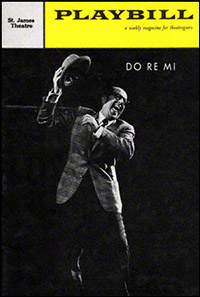 |
|
The romantic ballad "Make Someone Happy" is an excellent example of Jule Styne's skill at collaborating. I don't know which came first, Styne's tune or Comden and Green's lyrics, but regardless of the creative order, the finished elements are remarkably in sync. When you hear the swell of the lush refrain of an orchestral version of "Make Someone Happy," you feel the same lovely intention you would hear in the lyrics.
| |
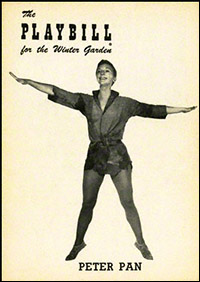 |
|
Although most of the score to Peter Pan was written by Moose Charlap and Carolyn Leigh, it's impossible to imagine this classic musical without its whimsical anthem, "Never Never Land." Jule Styne's dancing, darting melody positively flies and perfectly captures the yearning for a magical, far-away place that Peter inspires in all of us.
| |
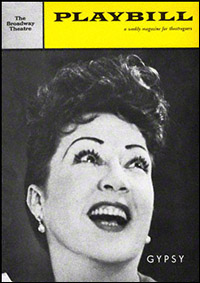 |
|
"Small World" from Gypsy is another song where it's nearly impossible to extricate the music from the lyrics, due in no small part to the premiere craftsmanship of the great Stephen Sondheim. Still, Jule Styne's melody — even all by itself — is pretty perfect for the moment in the musical. The way the tune sort of dips its toes in before hitting full legato ("We have so much in common, it's a phenomenon. We could pool our resources, by joining forces, from now on. Lucky..."). Styne managed to write a piece of music that actually flirts!
| |
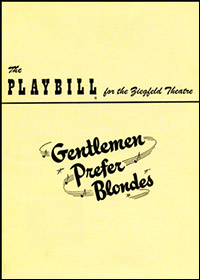 |
|
"Diamonds Are a Girl's Best Friend" is a classic in the truest sense of the word. Introduced by the quirky, larger than life actress Carol Channing, one might have thought the song needed her idiosyncratic oomph to fully fly its flag, but in a wholly different rendition by Marilyn Monroe in the movie version of Gentlemen Prefer Blondes, the song seduced millions and millions more. Lo and behold, without either of those great ladies, "Diamonds Are a Girl's Best Friend" has gone on to occupy an indelible place in pop culture, popping up everywhere from strip clubs to jewelry commercials. This gem shines bright in the crown of Jule Styne's accomplishment.
| |
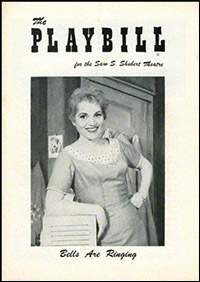 |
|
With "Long Before I Knew You," Jule Styne once again composed a ballad that got right to specific heart of what the words are also expressing. In the verses where the lyrics rhapsodize, "I pictured someone who'd walk and talk and smile as you do," Styne provided a tune that spins and spirals like a person in love feeling the rush of their dreams at last coming true. Bells Are Ringing has many assets, but I believe the beauty of this song, which closes the first act, is crucial to the audience's investment in the lead characters and their romance.
| |
 |
|
Some might question my inclusion of "Let Me Entertain You" from Gypsy instead "Everything's Coming Up Roses." Of course, "Everything's Coming Up Roses" is a killer showstopper and a cherished standard, but for me, it's only really engaging when performed in the (thrilling) context of Madame Rose's jackknife decision to cut her losses with the daughter that left her and switch her focus to the one that stayed. "Let Me Entertain You," on the other hand, while merely special material for a kiddie show (and later a burlesque act) in Gypsy, has proven quite effective everywhere else. For all the fabulous songs Bernadette Peters sang in Gypsy, she chooses to open her concerts with "Let Me Entertain You." It's such a simple, basic idea: Let me entertain you. Isn't that the core of what show business is about?
| |
 |
|
There are a lot of first-rate songs in the score to Bells Are Ringing, including (to name but a few!) the standard "Just In Time," the 11 o'clock barnstormer "I'm Going Back" and the aforementioned "Long Before I Knew You." Still, the most exquisite is the wistful "The Party's Over." It has certainly entered our collective consciousness in a profound way. The words expertly convey a feeling we all know — all too well — but the music transcends even that, capturing exactly the very sadness that comes with every ending. The metaphor "the party's over" is a useful one, and if it is forever linked to the song, the song is so powerful because of its music.
| |
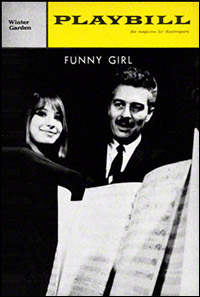 |
|
"Don't Rain On My Parade" represents a real home run for Jule Styne. The lyrics are great, the use of the number in the show is great, Barbra Streisand's legendary performance (one she continues to reprise decades later) is even greater than great. But it is the tune that gets inside your head and gets under your skin. Styne gave us an anthem for underdogs everywhere, heavy on "the perilous night" as far as anthems go, with his driving beat — the manifestation of obstacle — and an inevitable triumph that coaxes and fuels and inspires.
| |
 |
|
It's hard to remember how much you love "People" because it's such a huge hit that we've all heard too many times. I'm a huge fan of both Barbra Streisand and Funny Girl, but I've still heard "People" hundreds of times when I didn't want to hear it — in elevators and lobbies and at karaoke bars where it was the only showtune someone could find. But there's a reason for this mammoth impact and it is Jule Styne's soaring melody. Styne's music rises and crashes and conjures everything the lyrics attempt without any of the lyrics' syrupy sentiment.
(Ben Rimalower is the author and original star of the critically acclaimed Patti Issues. Read Playbill.com's coverage of the solo show here. Visit him at benrimalower.com and follow @benrimalower on Twitter.)









